

DFID merger: FCDO will not house a separate ODA department. LONDON — The U.K. development secretary shared early details of what the new Foreign, Commonwealth & Development Office will look like Monday, describing it as a “blended new organization.”

But Anne-Marie Trevelyan admitted the merger of the Department for International Development with the Foreign & Commonwealth Office was “challenging,” while DFID’s most senior civil servant Nick Dyer said it could take years to properly integrate staff. Brexit and UK Environmental Policy and Politics. BBC, 13 June 2018, [accessed 26 June 2018].
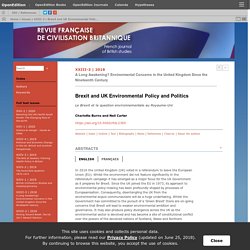
Burns, Charlotte, The EU Referendum and the Environment, (London, Friends of the Earth, 2015), available at: Burns, Charlotte [and 13 others, The EU Referendum and the UK Environment: An Expert Review (2016), [accessed 2 July 2018].
Satellites and space programmes from 1 January 2021. EU space programmes in which UK participates These include: the European satellite navigation programmes, Galileo and European Geostationary Navigation Overlay Service (EGNOS) the Copernicus Earth Observation space programme the EU Space Surveillance and Tracking (EUSST) programme.

Report Liability for AI and other digital technologies.
EU guidance on legislation around digital technologies – mattsmi123
Shaping Europe’s digital future. Artificial intelligence (AI) has become an area of strategic importance and a key driver of economic development.
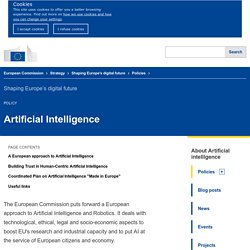
It can bring solutions to many societal challenges from treating diseases to minimising the environmental impact of farming. Artificial Intelligence – Who is liable when AI fails to perform? Insight. Who is liable when AI fails to perform?
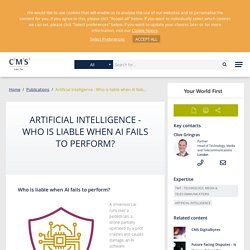
The inevitability of AI disputes Who is at fault when an AI system fails to perform? Artificial Intelligence ("AI"): Legal Liability Implications. Background Household appliances, vehicles, medical equipment, drones and other products are increasingly using AI and, in particular, machine learning and NLP (natural language processing) technologies to automate decision making.
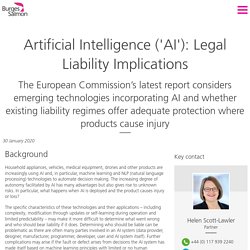
The increasing degree of autonomy facilitated by AI has many advantages but also gives rise to unknown risks. In particular, what happens when AI is deployed and the product causes injury or loss? The specific characteristics of these technologies and their applications – including complexity, modification through updates or self-learning during operation and limited predictability – may make it more difficult to determine what went wrong and who should bear liability if it does. Determining who should be liable can be problematic as there are often many parties involved in an AI system (data provider, designer, manufacturer, programmer, developer, user and AI system itself).
Potential for harm? Existing liability regime European Commission findings. Regulation of AI and Big Data. As the seat of the first Industrial Revolution, the UK has a long history of designing regulatory solutions to the challenges posed by technological change.
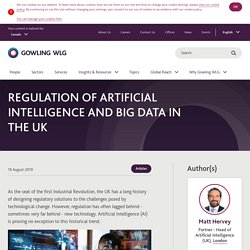
However, regulation has often lagged behind - sometimes very far behind - new technology. Artificial Intelligence (AI) is proving no exception to this historical trend. Is a specialist regulator needed? In the first place, there is currently no consensus on whether the development of AI requires its own dedicated regulator or specific statutory regime. Gathering evidence for its May 2018 report "AI in the UK", the Select Committee on AI of the House of Lords found that opinions were divided into three camps: "those who considered existing laws could do the job; those who thought that action was needed immediately; and those who proposed a more cautious and staged approach to regulation".
Digital surveillance can help bring the coronavirus pandemic under control – but also threatens privacy. Apple and Google are collaborating on new technology that will alert smartphone users who have come in sustained contact with someone who has tested positive for COVID-19.

Users will need to opt-in to the contract tracing system, which will use Bluetooth technology in both iPhone and Android phones in ways designed to protect privacy. The plan puts the weight of the two tech giants behind the numerous efforts of universities, public health authorities and nonprofits to develop apps that warn people of potential exposure without building new databases or relying on government collection of location data, as is being done by a number of countries around the world.
As a technology, law and security scholar at American University Washington College of Law, I study questions of privacy and surveillance. Privacy in the balance. Right to Privacy in the Digital Age. About digital privacy and human rights Digital technologies do not exist in a vacuum.
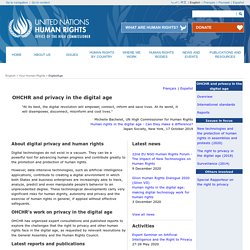
Digital Ecosystem final 2. Protecting privacy in the digital age. Ambient Privacy is Needed in the Digital Age. A new global privacy initiative, sponsored by Canada’s federal privacy commissioner, calls on governments, businesses, legislators and users to embrace and protect privacy as an important right with social value in and of itself.

Daniel Therrien is one of some 80 privacy officers and commissioners from around the world calling for an update to and strengthening of their countries’ privacy and data protection laws. And while they did not use the term, the notion of “ambient privacy” is one that aligns well with their initiative. Ambient privacy advocates say there is a value in not being monitored on a daily basis. Data-Driven Innovation: Big Data for Growth and Well-Being. Data ownership rights and controls. Big Data & Issues & Opportunities: Data Ownership. In this twelfth article in our series on "Big Data & Issues & Opportunities" (see our previous article here), we take a closer look at the data ownership issues surrounding the (big) data value chain and examine how such issues are addressed at EU and Member State level.
Where relevant, illustrations from the transport sector will be provided. The European Commission has voiced on multiple occasions the most important legal issues in a data environment. No One Owns Data by Lothar Determann. Abstract Businesses, policy makers, and scholars are calling for property rights in data. They currently focus particularly on the vast amounts of data generated by connected cars, industrial machines, artificial intelligence, toys and other devices on the Internet of Things (IoT). This data is personal to numerous parties who are associated with a connected device, for example, the driver of a connected car, its owner and passengers, as well as other traffic participants. Enhancing Access to and Sharing of Data : Reconciling Risks and Benefits for Data Re-use across Societies. How AI Will Redefine The Way We Think About Ownership. 20180730 HMT Discussion Paper The Economic Value of Data.
Enhancing Access to and Sharing of Data : Reconciling Risks and Benefits for Data Re-use across Societies. Regulate social media? It's a bit more complicated than that. Free speech is a key aspect of the internet, but it has become increasingly obvious that many online will push that freedom to extremes, leaving website comment sections, Twitter feeds and Facebook groups awash with racist, sexist, homophobic or otherwise unpalatable opinions and vitriolic views, and obscene or shocking images or videos.
Net neutrality is important for transparent communication of information about the environment. Loss of net neutrality, or efforts to restrict access the certain webpages could harm efforts to monitor the environment and share results of such monitoring – tomaugust
The borderless nature of the internet, where a website may be hosted in one country, operated by staff in another, with comments left by readers in a third, poses a thorny problem for website operators and government agencies seeking to tackle the issue. In Britain, the telecommunications regulator Ofcom recently issued a report discussing the issues around online harm and potential ways forward. Citizen Science (Working Group) — UKEOF. CSWG Chair: Rob Grew (EA)UKEOF CSWG Secretariat Lead: Michael PocockUKEOF CSWG Secretariat Support: Victoria Barlow Citizen science can broadly be defined as the involvement of volunteers in science.
It has a vital role in scientific research and education, and the potential to help meet some of the challenging demands of environmental monitoring at the national scale. This gives citizen science a clear relevance to government policy across the UK, and puts citizen science firmly on the agenda for UKEOF. The UKEOF Citizen Science Working Group aims to provide a forum where member organisations can share good practice and discuss future needs and plans for working with volunteers to provide high quality, environmental observation data. As part of regular citizen science working group, members provide updates about their organisation' initiatives to inform the wider community of areas of work or planned events. UNESCO is requesting a citizen deliberation on AI: We want to hear from Canadians.
Representative of calls for protection of citizen rights with respect to digital technologies. – mattsmi123
The role of artificial intelligence in achieving the Sustainable Development Goals. Our review of relevant evidence shows that AI may act as an enabler on 134 targets (79%) across all SDGs, generally through a technological improvement, which may allow to overcome certain present limitations. However, 59 targets (35%, also across all SDGs) may experience a negative impact from the development of AI. For the purpose of this study, we divide the SDGs into three categories, according to the three pillars of sustainable development, namely Society, Economy, and Environment11,12 (see the Methods section).
Human Rights, the Sustainable Development Goals & the Law: International Legal Symposium - CISDL - Centre for International Sustainable Development Law. TCLP Climate Contract Playbook 1st Edition. The Role of Smart Contracts in Sustainability: Worldwide Research Trends. 1. Introduction A contract is where individuals, groups, companies, institutions, and even governments enter into an agreement, where each of them is committed to fulfilling certain conditions. Blockchain Application for the Paris Agreement Carbon Market Mechanism—A Decision Framework and Architecture. Cost-effective mitigation of greenhouse gas (GHG) emissions is crucial for limiting the global temperature increase to well below 2 °C, the target set by almost 200 national Parties of the Paris Agreement [1].
Carbon pricing is one of the most widely used policy instruments for cost-effective GHG mitigation, with 57 GHG pricing initiatives globally in 2019 and 96 Parties considering to use carbon pricing [2]. 124402 WP Blockchainandemergingdigitaltechnologiesforenhancingpostclimatemarkets PUBLIC. GainForest Vision. Updated: Using Blockchain Technology to Protect the Rainforest - Rainforest Foundation US. Rainforest Foundation US is using blockchain and related technology to track, verify, and link direct financing to communities for protecting and regenerating forests Updated 25 June 2020: Please see the latest on this project below. Smart contracts. v2002569 1.
Archaeological and Environmental Forensic Science. Agnew, R. 2012. Protection of the environment in relation to armed conflicts — Summaries of the Work of the International Law Commission — International Law Commission. Last update: December 11, 2019 Protection of the environment in relation to armed conflicts.
Environment is now protected in international law during armed conflict – tomaugust
Observing the Earth to enforce environmental law. COVID-19 and Illegal Wildlife Trade: Where does the Law Fail and How Digital Technologies can help? World Wildlife Report 2020 9July. Digital Catapult - Using technology to fight the illegal wildlife trade. The trade of illegal animal products is valued at £17 billion per year, and sits fourth as the most lucrative crime after drugs, weapons and human trafficking. Illegal wildlife trade technology update. Digital revolution to use the power of data to combat illegal wildlife trade and reduce food waste. Jeremy Wright will also announce government’s contribution to new fund, which will be up to £30 million, to spark a wave of tech innovation World-first ‘data trust’ could see conservationists sharing audio and image data to help tackle illegal wildlife trade This is part of Government’s modern Industrial Strategy which will harness the power of technology to help make a real difference to people’s lives.
Artificial intelligence in environmental monitoring.